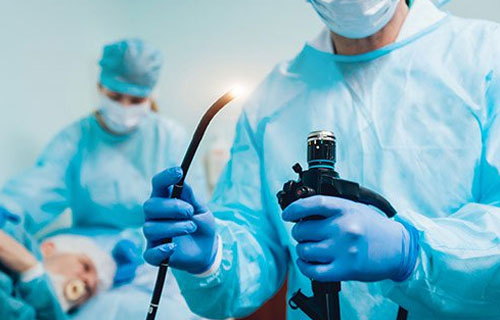𝐠𝐚𝐧𝐞𝐬𝐡𝐠𝐚𝐬𝐭𝐫𝐨@𝐠𝐦𝐚𝐢𝐥.𝐜𝐨𝐦

𝐆𝐈 𝐄𝐧𝐝𝐨𝐬𝐜𝐨𝐩𝐲 𝐢𝐧 𝐂𝐡𝐞𝐧𝐧𝐚𝐢 – 𝐀𝐝𝐯𝐚𝐧𝐜𝐞𝐝 𝐃𝐢𝐚𝐠𝐧𝐨𝐬𝐢𝐬 𝐚𝐭 𝐆𝐄 𝐂𝐥𝐢𝐧𝐢𝐜
At GE Clinic & Endoscopy Centre, we offer expert GI endoscopy services to diagnose and treat a wide range of gastrointestinal conditions. Led by Dr. S. Ganesh, a UK-trained gastroenterologist with over 30 years of experience, our clinic in Thiruvanmiyur, Chennai is equipped with advanced technology for safe, accurate, and minimally invasive procedures.
🔍 𝐖𝐡𝐚𝐭 𝐈𝐬 𝐆𝐈 𝐄𝐧𝐝𝐨𝐬𝐜𝐨𝐩𝐲?
GI endoscopy is a diagnostic procedure that uses a flexible tube with a camera (endoscope) to examine the digestive tract. It helps detect issues in the:
. Esophagus, stomach, and small intestine (upper GI endoscopy)
. Colon and rectum (lower GI endoscopy or colonoscopy)
This procedure is essential for identifying ulcers, bleeding, polyps, tumors, and inflammation.
🩺 𝐖𝐡𝐲 𝐂𝐡𝐨𝐨𝐬𝐞 𝐆𝐄 𝐂𝐥𝐢𝐧𝐢𝐜?
. 𝐄𝐱𝐩𝐞𝐫𝐭𝐢𝐬𝐞: Dr.Ganesh is a Fellow of the American Society of Gastrointestinal Endoscopy and trained at the Royal College, London.
. 𝐏𝐫𝐞𝐜𝐢𝐬𝐢𝐨𝐧 𝐃𝐢𝐚𝐠𝐧𝐨𝐬𝐢𝐬: Real-time imaging for accurate evaluation
. 𝐌𝐢𝐧𝐢𝐦𝐚𝐥𝐥𝐲 𝐈𝐧𝐯𝐚𝐬𝐢𝐯𝐞: Quick recovery and reduced discomfort
. 𝐀𝐟𝐟𝐨𝐫𝐝𝐚𝐛𝐥𝐞 𝐂𝐚𝐫𝐞: Transparent pricing and personalized treatment plans
We also perform therapeutic endoscopy to stop GI bleeding, remove polyps, and treat strictures—ensuring comprehensive care under one roof.
📍 𝐒𝐞𝐫𝐯𝐢𝐧𝐠 𝐂𝐡𝐞𝐧𝐧𝐚𝐢 & 𝐁𝐞𝐲𝐨𝐧𝐝
Conveniently located in Thiruvanmiyur, GE Clinic serves patients from Adyar, Nandanam, Mylapore, and across Chennai.
𝐒𝐜𝐡𝐞𝐝𝐮𝐥𝐞 𝐲𝐨𝐮𝐫 𝐆𝐈 𝐞𝐧𝐝𝐨𝐬𝐜𝐨𝐩𝐲 𝐭𝐨𝐝𝐚𝐲 and take the first step toward better digestive health.

